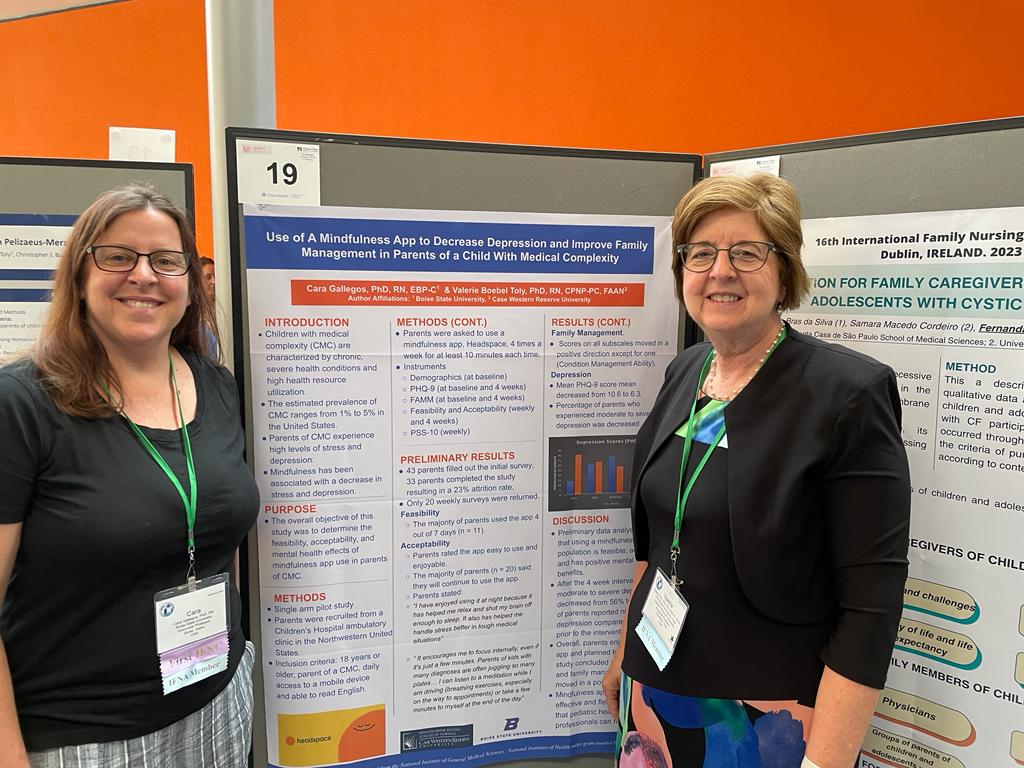Associate Professor Cara Gallegos went international with her mindfulness research in June, participating in the International Family Nursing Conference in Dublin, Ireland.
Gallegos researches mental health interventions for parents of children with medical complexities; these are chronic or serious illnesses that typically require high levels of care. This particular area of research is understudied, so Gallegos was grateful for the opportunity to network and connect with other researchers from around the world working in the same niche as herself.

“There were a lot of opportunities for collaboration because everyone is doing work on the topic of parents of children with medical complexities,” she said. “People are really invested in it.”
Gallegos presented an overview of existing research on what these parents experience while they are in the pediatric intensive care unit. Now published in Critical Care Nurse, the review describes strategies that nurses may find helpful when supporting these parents.
Gallegos also gave a poster presentation covering preliminary findings from her study funded by the Mountain West Clinical and Translational Research Infrastructure Network. This is a pipeline program designating funds from the National Institutes of Health specifically for smaller research schools in the Mountain West region and connecting researchers with mentors.
Gallegos presented the poster in conjunction with her mentor from the program, Valerie Toly, an associate professor of nursing at Case Western Reserve University. They are researching whether mindfulness – practiced through a phone app – can help lower depression and improve family management for parents of children with complex medical conditions.
Finding family solutions that last
Parents of children with medical complexities – like chronic or severe illnesses, major functional limitations and substantial health service needs – tend to have higher levels of stress and depression than most people. Not only are they juggling parenting, but many times their homes become mini intensive care units as they care for their child’s complex health needs, too.
Sometimes the only respite they experience occurs when their child is hospitalized in the pediatric intensive care unit. But having a child in the hospital comes with a different kind of stress in itself. So Gallegos is looking for a long-term solution to address stress and depression no matter where they are.
In addition to her research, Gallegos is also on the Board of Directors at Rays for Rare, a non-profit organization offering various means of support for families of children with medically complex diagnoses. Their most recent advocacy efforts aim to establish a respite facility in Idaho, to give parents more options for a break.
There are about 3,000 families in Idaho with at least one child with medical complexities, but Idaho currently has no long-term care facility for these children. Parents must rely on the care they can provide at home or what the child receives in the pediatric intensive care unit.
“At the end of the day, having a child in the [pediatric intensive care unit] is stressful, and having a child with medical complexity is stressful,” Gallegos said. “The interventions that I’m interested in are all interventions that will hopefully decrease stress or help families cope with the stress.”
Gallegos’ study is supported by an award from the National Institute of General Medical Sciences, National Institutes of Health under grant number U54 GM104944.